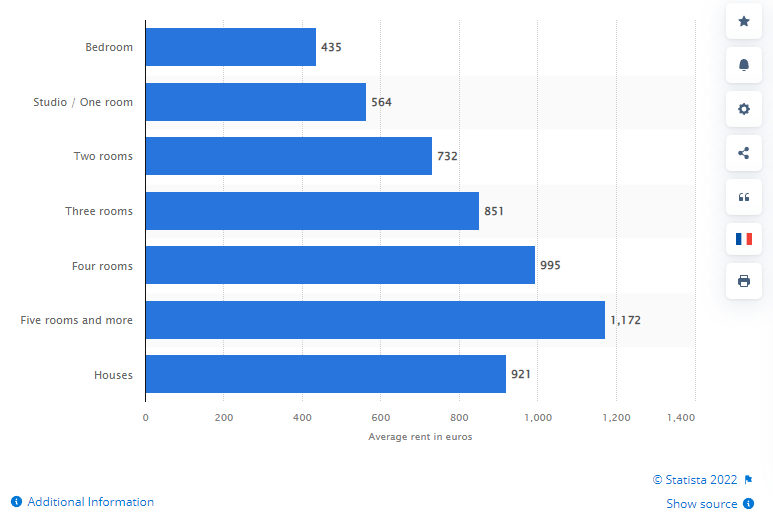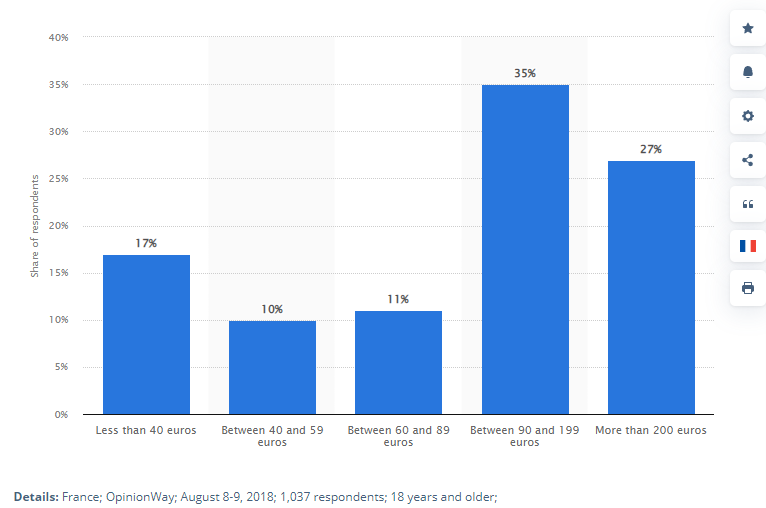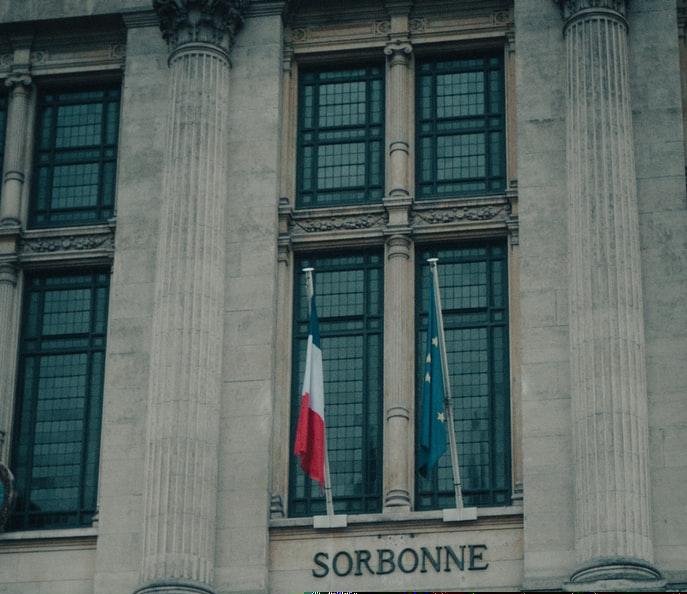According to a Statista report, there were 700,000 (seven lakh) Indian students enrolled in overseas educational institutions in 2020 for post-secondary education.
This figure is expected to rise to nearly two million (18,00,000) — twenty lakh by 2024.
Out of these students, many choose France for their postgraduate education.
But why France?
France has a lot of things to offer to a prospective Masters student from India:
- A host of courses, ranging from science to the arts.
- A number of scholarships from the institutions.
- Excellent work opportunities post your study.
- Affordability of tuition fees (Compared to other European Union nations like the UK).
- Unmatched opportunities for Indians as both private and public universities are open to international master’s degree students.
The Basics: A Master’s Degree In France For Indian Students
And now, for the meat and potatoes of this article: how much will you have to shell out to complete a Masters degree from a good French University.
Here is the short version, (specifically for Indian students):
| Cost Category | Lower Range in EUR | Upper Range in EUR | Lower Range (in ₹) | Upper Range (in ₹) |
| Tuition Fees (per year) | 3,800 | 20,000+ (For super-specialization programs) | 3,11,000 | 16,50,000 |
| Visa (The étudiant visa) | 159 (99 + 60) | 159 (99 + 60) | 13,400 | 13,400 |
| Rent (per month) | 450 | 3,000+ (for 3bhk apartments – most people choose to split these). | 37,000 | 2,50,000 |
| Food (per month) | 350 (including one meal a week at a restaurant) | 600 | 28,000 | 48,000 |
| Transport (per month, including weekly leisure) | 150 | 250+ | 12,000 | 20,000 |
Note: In the table given above, the tuition fees have been tabulated by taking data from universities only for their full-time, on-campus two-year (or one and a half year) courses.
This means that if your course is shorter, if part of your course is online, or if you’re splitting between universities for your study program, costs may vary.
In the first of those two cases, you are likely to see a reduction in tuition fees, and if you’re splitting universities, account for a 20-30% increment in all the listed costs.
Medical and veterinary courses have not been included when compiling the data for these average costs, although those range between €30,000 to €45,000 per year for international students.
Also, understand that the conversion values of the Euro (€) to the Rupee (₹) were averaged, and as such may vary by the time you read this article.
Even the smallest fluctuation in the forex markets can cause significant changes for Indians, so don’t forget to double-check the currency rates. Surprisingly, this is an aspect many people neglect.
The Specifics: A Masters Degree In France For Indian Students
This table was simply a rough meter-gauge for what a master’s degree in France for Indian students costs.
If that’s all you were here for, the next step is to identify the right university and programme for you. You can do this by looking through data-heavy lists such as the QS Universities ranking 2023 (some 32 French Universities have made the list, a rather impressive feat).
If you’d rather not go through mountains of data, statistics, and analyses to find out which is your “best-fit” course or university, you might want to look into using a tool such as SelectRight.
SelectRight is with you every step of the way, right from shortlisting prospective universities to cost counselling and the actual application.
These tools take all the data that we don’t want to look at, analyze them, and use augmented algorithms to give users a personalized recommendation list that will help them find the university that best matches their needs with minimal fuss.
Tuition Fees: Everything You Need To Know
As of the autumn intake from 2019 onwards, there has been an increment in the cost of tuition fees that international students (including Indian students) have had to pay.
The revised numbers stand as given under:
- €2,770 per year for Bachelor’s degree programs (Licensed)
- €3,770 per annum for Master’s degree programs
- €380 per year for Doctorate programs (no difference in fees for international and European students).
These figures are, of course, for public universities. The tuition fees at private universities stand in the range of €3,000 to €25,000 €+ per annum.
The costs of these tuition fees may seem astronomical to some, but it is much more affordable when compared to the tuition costs of master’s degree programs in other first-world European countries such as the United Kingdom.

Nonetheless, there are a host of scholarships available that Indian students can apply for, and there are a number of tuition fee bursaries available to them too. In fact, occasionally, meritorious Indian students can also get a 100% fee bursary.
Use the “CampusBourses” tool available on the official Campus France Website to find a list of most of the available scholarships in French public universities, many of which are country specific for ease of application.
Other than that, most universities in France (irrespective of whether they are publicly or privately funded) have numerous university-specific and college-specific scholarships on offer too, so contact your chosen college’s admissions office to get those details.
Another factor to keep in mind is that while the tuition fees in French public universities are fixed, the prices in French private universities get incremented year upon year, by about 3-4%.
The fact that most people fail to remember is that there are also certain scholarships that only open up once you arrive onto your college’s campus, so it’s always worth frequenting the student affairs office in your first weeks on campus.
Visa Costs
When travelling to France for higher education, Indians will need to buy a VLS-TS visa, also known as the étudiant visa.
It is a type of long-term visa that is also widely accepted as a residence permit in France.
The visa costs €99 to apply for, and can only be applied for after you have received your university acceptance letter.
The visa also needs to be “ratified” within two months of your arrival inside France, which costs a further €60 to wrap up.
Aside from permitting an Indian to live and pursue his/ her education within France, a holder of a VLS-TS visa is also permitted to work a maximum of 960 hours per year, but not more than 20 hours each week.
Because France is a part of the Schengen list of countries, holders of an étudiant visa are allowed visa-free travel to all of the Schengen countries.
The Schengen is a group of 26 countries that have removed all forms of border control for their citizens across their mutual borders.
Rent

As you can see in the above chart, the average rent in France ranges from about 400 per month to upwards of a thousand euros per month. Keep in mind that the rent is for one person and that the two-bedroom flats are for two people.
For instance, the two-bedroom flat that costs €732 would actually be billable at €1464 €, and this rent is split between two people.
Even major cities such as Lyon have similar prices, with Paris being the only notable exception from this trend, having about 15% higher prices than the average for the rest of France.
If you are lucky enough and farsighted enough to get student accommodation, you can knock about 18,000 to 24,000 off your rent annually.
The student accommodation on campus can be either fully catered, semi-catered, or self-catered.
Fully catered accommodation is more expensive and includes all meals in a day.
Semi-catered includes breakfast and/or lunch.
Self-catered means that students need to arrange their own food, although there is usually access to common kitchen or kitchenette facilities for purposes of cooking.
Our advice is: if you are being offered student accommodation, even if it’s off-campus, it is an opportunity that should be grabbed with both hands, as it is rather difficult for international students to get residence in student halls.

Apply for student accommodation as early as possible in order to have the best chance at getting it (note: this requires a down-payment in order to secure your spot).
According to this page on the Campus France (official) website, “you have a monthly budget of 600 to 800 Euros to cover food, transport and housing expenses. Of course, this amount varies depending on the location or type of accommodation of the student”.
However, based on our latest research, it is wise to account for about €900 to €1,200 for a respectable lifestyle with off-campus accommodation (not in the student residence halls).
It is not uncommon for students to find living in houses with other students splitting the rent more affordable as compared to living on their own in studio or one-bedroom apartments.
This depends largely on where you choose to live (close to the city center, etc) and whether or not your university has a tie-up with your housing provider/ house rental company.
Again, your university’s student affairs office is the best place to go for guidance with rent. Sometimes, they may even match you up with roommates in particular areas.
The university student affairs officials give the best information about rent because aside from being locals of the area, they know that students usually do not have a lot of money to blow.
Transport

The public transport system in France is of a reasonably high standard, especially when it is compared to what we have back home in India.
The best way to get around in a city is by bicycle for short distances (buy, don’t rent) and by bus or train for longer distances.
With adult cycles costing €30 per 24 hours (€900 per month), it makes more sense to make an investment and buy an affordable city cycle early on.
You can also choose one of the Eurorail InterRail “one country” train passes that will allow you unlimited use of France’s 31,000 kilometres of Railway lines on their respective travel days.
You can buy passes with 1, 2, 4, 6, and 8 travel days in a month. Aside from that, there are also multi-country passes (remember your Schengen visa?)
These passes start from €127 €, and more details can be found on the EuroRail InterRailofficial website.
Footnotes
We hope that this article has been helpful in helping you estimate how much your Master’s degree will cost in France as an Indian student.
It is an extremely practical move to use university selection tools like the one we mentioned above, or at least to seek professional advice from those familiar with the system because foreign education systems are always a quagmire for us Indians.
With that, allow us to bid you good luck in your journey overseas. Fingers crossed!










